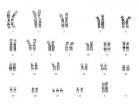(Press-News.org) Notre Dame astrophysicist Justin R. Crepp and researchers from NASA working with the Kepler space mission have detected an Earth-like planet orbiting the habitable zone of a cool star. The planet which was found using the Kepler Space Telescope has been identified as Kepler-186f and is 1.11 times the radius of the Earth. Their research titled, "An Earth-sized Planet in the Habitable Zone of a Cool Star" will be published in the journal Science today.
Kepler-186f is part of a multi-planet system around the star Kepler-186 which has five planets, one of which is in the center of the habitable zone—the region around a star within which a planet can sustain liquid water on its surface. While there have been other discoveries of Earth-sized and smaller planets, those planets have been found in orbits that are too close to their host stars for water to exist in liquid form. Findings taken from three years of data show that the intensity and spectrum of radiation from Kepler-186f indicate that the planet could have an Earth-like atmosphere and water at its surface which is likely to be in liquid form.
"The host star, Kepler 186, is an M1-type dwarf star which means it will burn hydrogen forever, so there is ample opportunity to develop life around this particular star and because it has just the right orbital period water may exist in a liquid phase on this planet," said Crepp who is the Frank M. Freimann Assistant Professor of Physics in the College of Science.
Crepp is building an instrument at Notre Dame named named "iLocater" that will be the first ultra-precise Doppler spectrometer to be fiber-fed and operated behind an adaptive optics system. His instrument, to be installed at the Large Binocular Telescope in Arizona, will identify terrestrial planets orbiting in the habitable zone of nearby M-dwarf stars, much closer to the Sun than Kepler-186, by achieving unprecedented radial velocity precision at near-infrared wavelengths. He and his research collaborators will also probe nearby terrestrial planets to tell what their atmospheres are made of.
"Prof. Justin Crepp's outstanding exoplanet research is helping us comprehend our complex universe and in particular those planets that are in the habitable zone. This much-anticipated discovery is shedding new light on planetary systems and their composition," said Greg Crawford, dean of the College of Science at the University of Notre Dame.
Crepp is one of only 11 Kepler Participating Scientists in the country. He and his colleagues are advancing the goals of the Kepler Mission by seeking to find terrestrial planets comparable in size to Earth, especially those in the habitable zone of their stars where liquid water exists and where life may be sustained.
INFORMATION:
Astronomers discover Earth-sized planet in habitable zone
2014-04-17
ELSE PRESS RELEASES FROM THIS DATE:
Internet use can help ward off depression among elderly
2014-04-17
It's estimated that as many as 10 million older Americans suffer from depression, often brought on by feelings of loneliness and isolation.
However, new research – a project that followed the lives of thousands of retired older Americans for six years – found that Internet use among the elderly can reduce the chances of depression by more than 30 percent.
"That's a very strong effect," said Shelia Cotten, a Michigan State University professor of telecommunication, information studies and media who led the project. "And it all has to do with older persons being able ...
Is Parkinson's an autoimmune disease?
2014-04-17
NEW YORK, NY (April 16, 2014) — The cause of neuronal death in Parkinson's disease is still unknown, but a new study proposes that neurons may be mistaken for foreign invaders and killed by the person's own immune system, similar to the way autoimmune diseases like type I diabetes, celiac disease, and multiple sclerosis attack the body's cells. The study was published April 16, 2014, in Nature Communications.
"This is a new, and likely controversial, idea in Parkinson's disease; but if true, it could lead to new ways to prevent neuronal death in Parkinson's that resemble ...
AGU: More, bigger wildfires burning western US, study shows
2014-04-17
WASHINGTON, D.C. -- Wildfires across the western United States have been getting bigger and more frequent over the last 30 years – a trend that could continue as climate change causes temperatures to rise and drought to become more severe in the coming decades, according to new research.
The number of wildfires over 1,000 acres in size in the region stretching from Nebraska to California increased by a rate of seven fires a year from 1984 to 2011, according to a new study accepted for publication in Geophysical Research Letters, a journal published by the American Geophysical ...
New study says probiotic use for infant colic is not effective in reducing symptoms
2014-04-17
CHICAGO, IL, April 17, 2014-- Colic affects about one in five infants in the United States annually and accounts for numerous pediatric visits during the first several months after birth. Research into probiotic use for reduction of colic symptoms was showing promise; however, the April 1, 2014 issue of the British Medical Journal (BMJ2014;348:g2107; Sung, Valerie) reported on a study, "Probiotics and Infant Colic," concluding that the use of the probiotic L reuteri for infant colic did not reduce crying or fussing in infants nor was it effective in improving infant sleep, ...
BUSM researchers find anti-seizure drug may reduce alcohol consumption
2014-04-17
Boston—Researchers from Boston University School of Medicine (BUSM) have discovered that the anti-seizure drug ezogabine, reduced alcohol consumption in an experimental model. The findings, reported in the American Journal of Drug and Alcohol Abuse, may lead to more effective treatments for alcoholism.
Excessive consumption of alcohol is one of the leading causes of illness and death in the U.S. and has significant negative economic impact by limiting the productivity of workers and necessitating huge health care expenditures.
According to the researchers, this study ...
Trisomy 21: How an extra little chromosome throws the entire genome off balance
2014-04-17
Occurring in about one per eight hundred births, Down syndrome - or trisomy 21 - is the most frequent genetic cause of intellectual disability. It results from a chromosomal abnormality where cells of affected individuals contain a third copy of chromosome 21 (1% of the human genome). A study conducted by Stylianos Antonarakis and his team in the Department of Genetic Medicine and Development at the University of Geneva (UNIGE) Faculty of Medicine, published in Nature, shed light on how the extra chromosome 21 upsets the equilibrium of the entire genome, causing a wide ...
Re-emergence of Ebola focuses need for global surveillance strategies
2014-04-17
NEW YORK – April 17, 2014 – EcoHealth Alliance, a nonprofit organization that focuses on conservation and global public health issues, published a comprehensive review today examining the current state of knowledge of the deadly Ebola and Marburg virus. The review calls for improved global surveillance strategies to combat the emergence of infectious diseases such as the recent outbreak of Ebola in West Africa that has claimed the lives of 122 people in the countries of Guinea and Liberia. According to the World Health Organization (WHO), the deadly Ebola virus can cause ...
Long-term effects of battle-related 'blast plus impact' concussive TBI in US military
2014-04-17
New Rochelle, NY, April 17, 2014—U.S. military personnel who served in Iraq and Afghanistan and suffered "blast plus impact" concussive traumatic brain injury (TBI) were compared to military personnel without TBI who were evacuated for other medical reasons. Differences in measures of overall disability, cognitive function, post-traumatic stress, and depression 6-12 months after injury are reported in an article in Journal of Neurotrauma, a peer-reviewed journal from Mary Ann Liebert, Inc., publishers. The article is available free on the Journal of Neurotrauma website ...
Fish consumption advisories fail to cover all types of contaminants
2014-04-17
A new modeling study suggests that fish consumption advisories for expecting mothers are ineffective in reducing infant exposure to long-lived contaminants like persistent organic pollutants (POPs).
The study, performed by a team of researchers including University of Toronto Scarborough PhD student Matt Binnington and Professor Frank Wania, looks at how different levels of environmental contamination, a mother's compliance with advisories, and the behavior of chemicals in the body influenced exposure in her children.
Their model estimates that women who stop eating ...
Proper stem cell function requires hydrogen sulfide
2014-04-17
Stem cells in bone marrow need to produce hydrogen sulfide in order to properly multiply and form bone tissue, according to a new study from the Center for Craniofacial Molecular Biology at the Herman Ostrow School of Dentistry of USC.
Professor Songtao Shi, principal investigator on the project, said the presence of hydrogen sulfide produced by the cells governs the flow of calcium ions. The essential ions activate a chain of cellular signals that results in osteogenesis, or the creation of new bone tissue, and keeps the breakdown of old bone tissue at a proper level.
Conversely, ...




